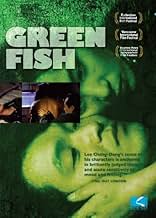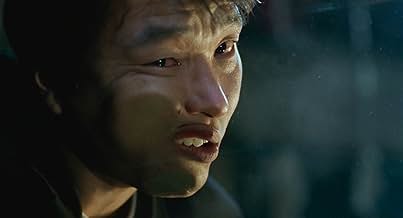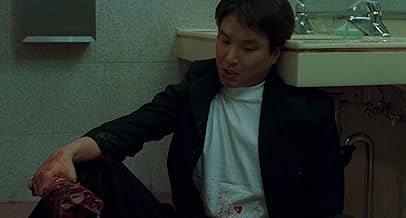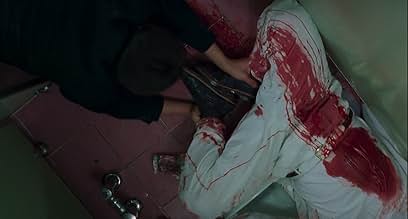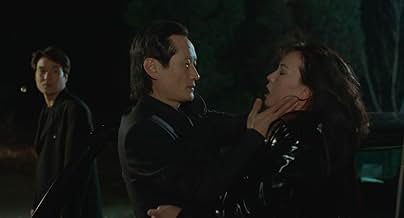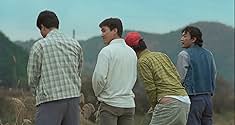IMDb RATING
7.0/10
2.4K
YOUR RATING
Returning home and finding his town drastically changed, a former soldier falls in with gangsters.Returning home and finding his town drastically changed, a former soldier falls in with gangsters.Returning home and finding his town drastically changed, a former soldier falls in with gangsters.
- Awards
- 20 wins & 6 nominations total
Kim Dong-gon
- Sandwich Man
- (as Dong-gon Kim)
Lee Ho Sung
- Elder brother
- (as Ho-Sung Lee)
Park Hye-Sook
- 3rd Brother's wife
- (as Hye-sook Park)
Son Yeong-soon
- Mother
- (as Young-Soon Son)
- Director
- Writer
- All cast & crew
- Production, box office & more at IMDbPro
Featured reviews
Lee Chang-dong's debut film reflects a changing Korea, one where apartment high rises have sprung up in the outskirts of Seoul while a young man has been away for his compulsory military service. He's as powerless to stop it as he is to stop the assault of woman on the train he comes in on, and that's one of the themes here, powerlessness coming along with the loss of innocence in a Korea that dehumanizes as it modernizes. He can't get a decent job and he can't stop his family from devolving into chaos, with one brother drinking too much. He's soon sucked in to a gang with a rigid power structure, more than once having to just stand there and take physical punishment, though we see that even "big brother" has a "big brother," making one wonder where the hierarchy ends. The film is well made and almost certainly more meaningful to Koreans in the late 90's, but to me it was dreary and uninspiring, with too much emphasis on the gangster element, even if it was nice to see Song Kang-ho in just his second film. I could have done without the chicken beheading though.
Lee Chang-Dong's movie have common themes I have noticed as I move backwards through his oeuvre. Male protagonists romance story tied up in a class system or one hierarchical social structure or another. Its about the indignation and class struggle, being mislead by the bright lights, whether it be women fame or fortune. The good are seldom rewarded and success is not won by having principles. Its more like a 'dogme 95' movie than a hollywood affair.
Its not overly violent and the overall tone is kinda light considering the bleak outcome of the story, conveying the absurdity of life rather than looking at it in a nihilistic way. City scapes contrast with rural city outskirts as do the inhabitants; this again puts it in similar ground to his latest movie Burning, which has alot in common with this one in many thematic ways. I would say that his fim making skills have grown and Burning was better, the cinematography for one thing is superior in the latter.
If you're looking for a good story that'll leave you awe-stricken or at least satisfied, then you've chosen the wrong film. How a man in his mid twenties can be naive on the par with a 14 or 15 year old just isn't plausible in the real world, especially in the late 90s, unless he is retarded. And the lead character is not retarded. Another idiocy of the film is that the lead who is, and looks obviously to be, in his mid 30s is playing a naive, almost moronic 24 year old. The film is hogwash, and I was annoyed after wasting almost 2 hours watching it.
I see this as a film about how hard it is to do the right thing in the complex modern world. Makdong's family used to own acres of farmland that are now covered in ugly apartment buildings and now they get by selling eggs to the residents. All Makdong wants to do is make this easier for his family and in the process he becomes a gangster just to get by. Even the gangsters are between doing the right thing and doing what they must to survive. Makdong's "Big Brother" likes to think of himself as different from the other thieves and killers that make up the underworld but in the end he is no better.
Green Fish is not a real gangster movie, but more an illustration of the battle between good and evil, between innocence and depravity, between the righteous one and those who only believe in the law of the strongest, between the city (and all its poisons) and the countryside (with its green fish). The law of the strongest is not only a matter of physical forces (strength, number), but also of mental ones (deception, manipulation, ambush, cynicism of the individual). The film has also a socio-economic dimension: the protagonist of the movie is a young man who has been released from the army. He has no job, but is hired by the immoral leader of a gang who appreciates his courage, his sincerity and his 'morality' (his sense of justice). And the women in all that? They have no other choice but to follow the strongest, if, and only if, they are young and beautiful. As for the unborn child, there is more than serious doubt about the real father
The first film by Lee Chang-dong contains already many ingredients of his later movies: a train, spasticity, gratuitous violence or exploitation of innocence. It says a lot about the director's vision on the way of the world.
The first film by Lee Chang-dong contains already many ingredients of his later movies: a train, spasticity, gratuitous violence or exploitation of innocence. It says a lot about the director's vision on the way of the world.
Did you know
- ConnectionsFeatured in Son-nim-eun-wang-e-da (2006)
- How long is Green Fish?Powered by Alexa
Details
- Runtime1 hour 51 minutes
- Color
- Sound mix
- Aspect ratio
- 1.85 : 1
Contribute to this page
Suggest an edit or add missing content


